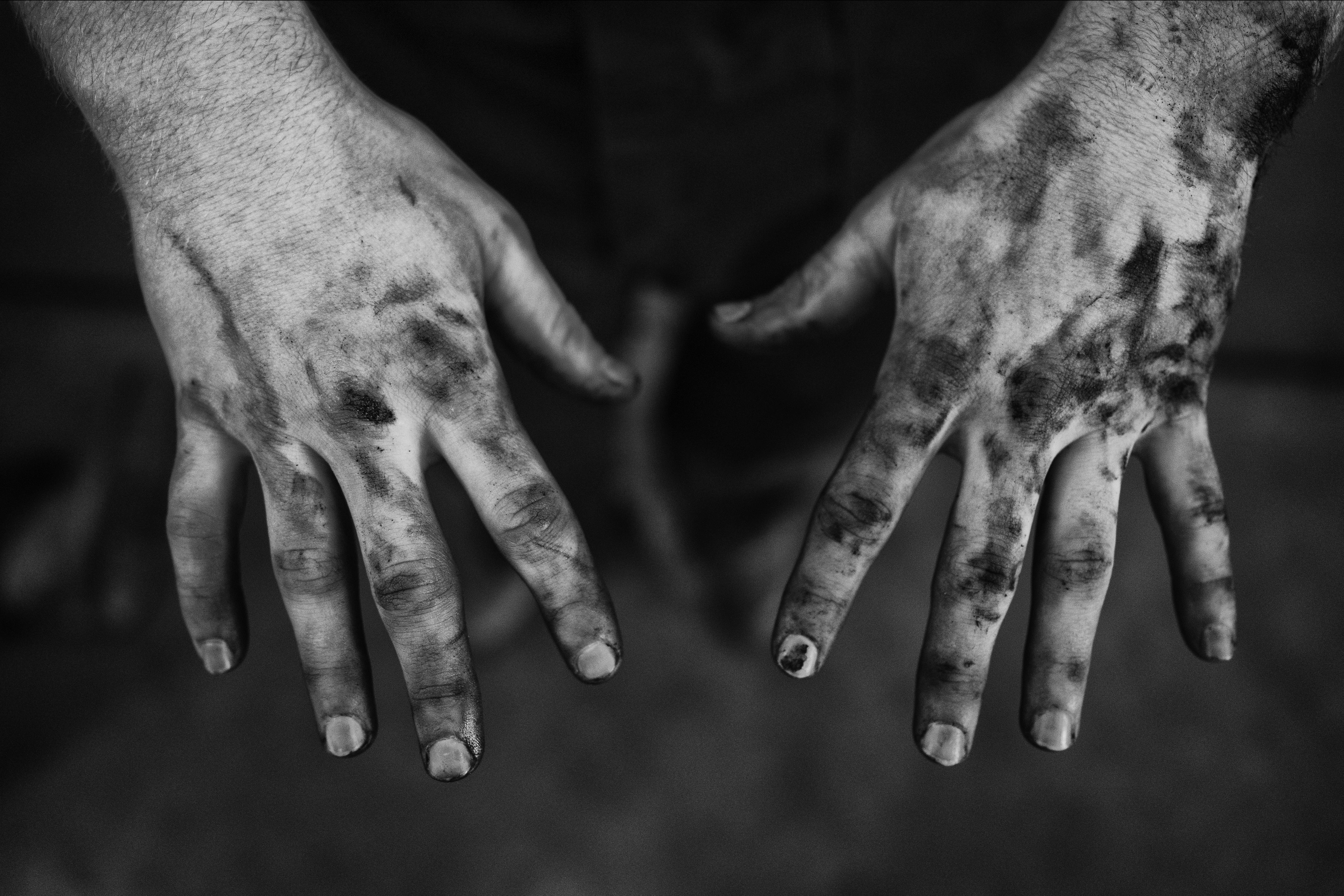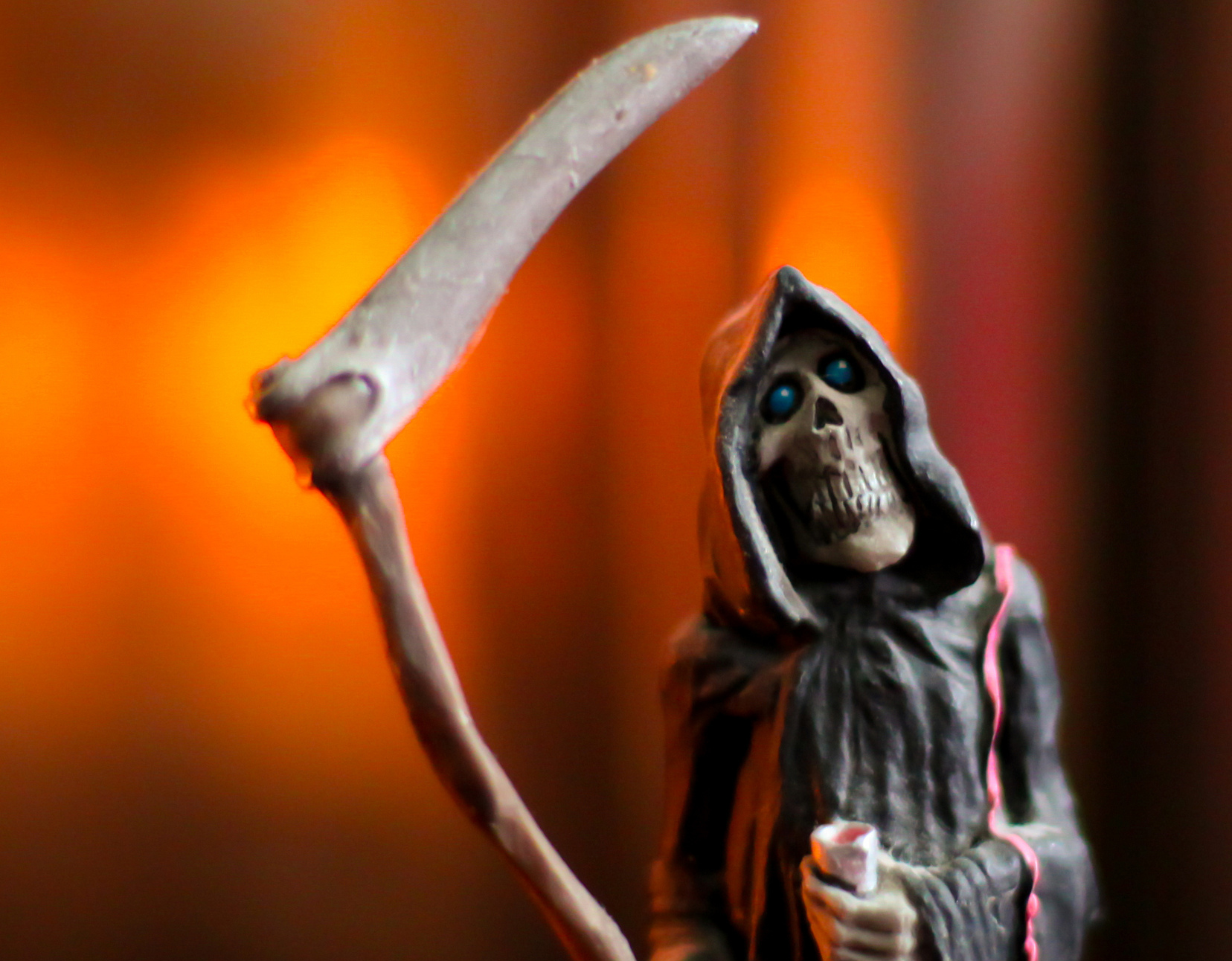Brandon Jennings
Each day after PT, Rake and I polish boots. We sit on my back porch, open our tins of Kiwi and pour cool water into the lids. We stuff our right hands into white tube socks, dip the socks in polish and then water. We shove our left hands into the bottom of the boots and rest the boots on our left thighs. We swirl small circles on the toes until the sun’s reflection becomes a few stars that burst off the boots, and then we grab our brushes and sweep until those few stars become two—one star for each of us. Then we polish the heels, and then the next boots. And when the polishing is finished, we pass the time talking about the day that Cammack died.
Frayed cloth fragments, red-wet flesh ribbons that stream from arms and legs, cracked shingles, hunks of jagged concrete and shattered bits of stone. Black smoke billows from a hole in the earth, and the heat of a fire beneath the smoke presses out into the cool spring air. Rake tells Sergeant Harris, “Cammack had a smile on his face when he walked out the door.” And Sergeant Harris spits a stream of tobacco juice into a yellow-brown mud puddle and says, “Dumb fucker.” Sergeant Harris stuffs a pinch of wintergreen Skoal behind his bottom lip. He leans against the Humvee’s hood for a short while and then shakes his head. He spits again, nods a couple times, and then tells us to get in the Humvee.
“We’re leaving him?” Rake asks.
“Pick up as much of him as you want,” Harris says.
A blonde-haired scalp is draped over a chunk of stone, a split jawbone rests in a mud puddle inches from a cracked glass bottle. The mud has absorbed most of the blood but isn’t deep enough to swallow the body parts. A jump boot stands erect, a shin sticks out the top; just below where the knee should be is a bit of BDU fabric; the blousing strap still clings to the boot despite the fact that the explosion sent the rest of the boot’s owner somewhere else. “There’s some of him,” Sergeant Harris says. The other boot lies on its side twenty yards away. Sergeant Harris points at the other boot. “There’s some, too.”
Rake wraps his fingers around the barrel of his M-16 and squeezes a layer of mud away then flips it at the ground.
“We’re lucky he didn’t get anyone else killed,” Harris says.
Rake snorts. “Are all these body parts invisible to you?”
Harris squats over Cammack’s weapon and says, “I meant one of us.”
Rake straddles the shin-filled boot. A breeze sweeps through and the frayed cloth of the BDU pants flutters. Black clouds drag across the sky, and a few side-swept rain drops hit my cheeks. Rake grabs the boot, most of which is covered in mud, but the toe is clean enough for Rake to see the reflection of his stubble-covered jaw. He strokes his chin and says, “That motherfucker could polish a boot.”
“Drop that,” Harris says. “Unless you plan on stacking the whole man on top.” Then he peels Cammack’s weapon from the mud.
Rake drops the boot between his feet. He is surrounded. A thumb, ring finger, and middle finger connected to a bit of hand rest beside a copper soup pot; a child’s arm blown off at the shoulder extended as if reaching for something: a rib cage half-covered in flesh, tangled bowels that leak from a charred torso, unnamable white and pink bits. Singed pieces of paper soak up red mud and the fire that rages in the center of the mine crater wisps into view as the smoke begins to thin out. “Senior Airman Cammack,” Rake says. “A real American hero.”
Rake sometimes says we should have grabbed all the pieces and tossed them into the fire that raged in that crater because, “It would’ve been the closest thing to a respectful ceremony we could get done.” But we didn’t burn anything. We dropped Cammack’s boots in the mud and hopped back in the Humvee and drove North, away from it all like it never happened because even though we’d lost Cammack, it was his fault for being dumb enough to think he was going to make a difference in the lives of children who spent their time tossing rocks at naval mines.
Rake saw some things I did not. He saw Cammack die, saw him step out of that house with a smile on his face. His flak helmet tilted slightly forward, almost covering his blue eyes. Children tossed hunks of rock at the naval-mine and each thump of rock on metal should have been a reminder of how dumb it was for Cammack to go into that house. But Cammack was already in. An old man had flashed a photograph of a woman in Cammack’s face, and Cammack had said, “The old guy’s wife is in that house,” and he went in after a woman he wasn’t even sure was real. A girl with a green scarf knotted around her throat heaved a rock at the mine, and Rake watched it float toward that naval-mine while Cammack took his first step out of the house. His lips moved, and he said something Rake couldn’t hear. All Rake saw were thin lips forming the last words Cammack would ever say.
The old man knelt on the wet ground and covered his face, twenty children tossed rocks, and Rake held a weapon in each hand. Rake had enough ammunition to kill each of those children. He could have dropped the weapons from his shoulders and fired round after round into each of the kids until they dropped lifelessly into the mud. They all died anyway, and if they were all dead, none of them would be able to throw rocks at the mine; Cammack could’ve walked the rest of the way over to Rake, and said something like, “She was already dead,” and then we could’ve left the dead children and the old man behind and got on with the mission.
But Rake didn’t shoot the children. And he didn’t aim at each of the rocks those kids tossed at the naval-mine and blast them out of the sky so that they burst like flak and became shards and dust that flittered to the soggy ground. The only thing I’m sure Rake did while I wasn’t there was that he did not die. I imagine all the rest.
When Sergeant Harris and I got to the blast site, body parts were everywhere. A shin was sticking out of Cammack’s boot; the boot was a couple steps away from the smoldering ruins of the house that he’d walked out of. The crease in the boot made it look like he was taking a step when the mine went off. His shin was there, like a skin-and-bone flower with camo petals that drooped haphazard around its red, white, and black center. His scalp clung to a rock, short blonde hairs still gelled into tiny spikes. The other boot had been blown twenty yards away. It was tipped over and looked empty. Rake and Harris talked about what had happened. “What an idiot,” and so on. I walked over to the boot that rested on its side and picked it up. There was nothing in it, nylon laces slashed in half. I wiped gore and mud from the toe with my thumb and saw the reflection of my hairless chin in the glassy blackness. Rake had picked up the other boot by then. He’d asked about what we were supposed to do. Harris said, “Get in the Humvee.” And we dropped the boots, got in the Humvee, and rode on.
This isn’t fascination. We don’t want to remember children’s body parts splattered all over a muddy town center. It’s not an obsession with understanding why these things happened, it’s not camaraderie or love for a man whose seen the same horrible things you’ve seen. Rake and I don’t pause when we finish polishing one boot and look each other in the eye and just know something. If we did, I’d say it was coincidence.
The closest thing I have to an explanation is that once we were polishing our boots and Rake said, “I’ve polished these bastards for three years now and they still don’t shine the way Cammack’s did.” He didn’t say that because he misses Cammack. We don’t polish our boots because we miss Cammack. We don’t tell Cammack’s story over and over because we want to remember Cammack. Rake’s talking about boots; he’s pissed that he can’t shine his boots as well as a man who was dumb enough to walk into a house that had a naval-mine propped against it.
And maybe Rake thinks he needs to polish his boots better than Cammack did or he’ll die in a stupid way—a thought that hinges on whether or not there are ways to die that aren’t stupid. I polish my boots because I love dipping the sock in polish and water, making tiny circles, and beating the brush across the leather. I love the way the smell of polish fights bonfire smoke in fall and smothers honeysuckle in summer. I love that I can step into my boots because Cammack died and I did not. I love that I barely knew him, and most of all I love that I can still say I don’t miss Cammack at all.
Brandon Davis Jennings is an Iraq War veteran from West Virginia. He is currently living in Michigan, where he is in the PhD Creative Writing program at Western Michigan University. His work has appeared in Crazyhorse, Black Warrior Review, The Berkeley Fiction Review, and is forthcoming in Hayden’s Ferry Review.


